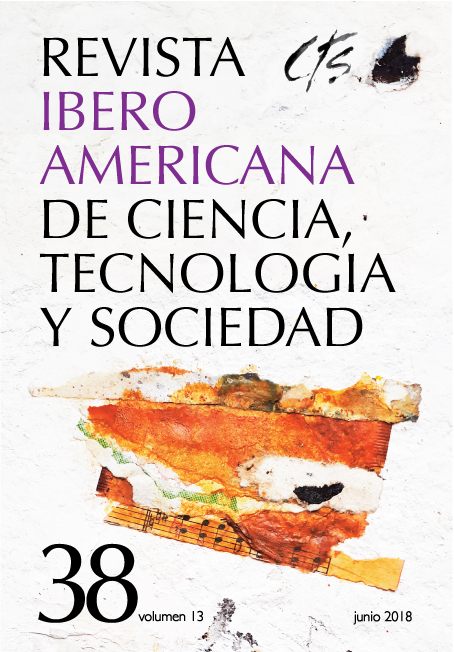Nanorobotics: Epistemological Bases and Social Impact
Keywords:
nanorobotics, rationality, economy, epistemology, biomedicineAbstract
In this article we present a philosophical characterization of nanorobotics and its relationships with techno-scientific rationality, the economy and society. The greatest difficulties and dangers in this field stem from its inherent uncertainty, as well as from the power that it has the capacity to deploy. On the other hand, due to the need that nanorobotics has to access the innermost dimensions of reality due to its extreme small size, there are deep connections between this technology and others such as computational simulations and virtual reality. Consequently, we carry out an approximation of the difficulties that derive from the epistemological characterization of nanorobotics applied to biomedicine, given the importance of this discipline and the paradigmatic role that it holds in the development of nanorobotics. Finally, we analyze some of its financial and social consequences.Downloads
References
A., HOGG, T. y SHIRINZADEH, B. (2006): “Nanorobotics System
Simulation in 3D Workspaces with Low Reynolds Number”, IEEE MHS 2006 International Symposium on Micro-NanoMechatronics and Human Science.
CAVALCANTI, A., ROSEN, L., KRETLY, L. C., ROSENFELD, M. y EINAV, S. (2004): “Nanorobotic Challenges in Biomedical Applications, Design and Control”, IEEE ICECS Int’l Conf. on Electronics, Circuits and Systems.
CAVALCANTI, A., WOOD, W., KRETLY, L. C. y ROSENFELD, M. (2006):
“Computational Nanomechatronics: Pathway for Control and Manufacturing Nanorobots”, IEEE CIMCA 2006. International Conference on Computational Intelligence for Modelling, Control and Automation.
DE CÓZAR ESCALANTE, J. M. (2003): “Nanotecnologías: promesas dudosas y control social”, CTS+ I: Revista Iberoamericana de Ciencia, Tecnología, Sociedad e Innovación, vol. 6, nº 5.
DE CÓZAR ESCALANTE, J. M. (2013): “Dimensiones de la investigación social sobre la nanobiotecnología”, Revista Iberoamericana de Ciencia, Tecnología y Sociedad, vol. 7, nº 20, pp. 91-109.
DE LA METTRIE, J. O. (1962): El hombre máquina, Buenos Aires, Editorial
Universitaria de Buenos Aires.
ESQUIROL, J. M. (2011): Los filósofos contemporáneos y la técnica. De Ortega a Sloterdijk, Barcelona, Editorial Gedisa.
FERNÁNDEZ AGIS, D. (2013): “Economía y nanotecnología, una relación
problemática”, Laguna. Revista de filosofía, nº 32, pp. 79-88.
FERNÁNDEZ AGIS, D. y FERNÁNDEZ CASTILLO, A. (2007): “La nanotecnología, inquietudes sociales y problemas éticos derivados”, El Catoblepas, revista crítica del presente, nº 61, p. 14. Disponible en: http://www.nodulo.org/ec/2007/n061p14.htm. Consultado el 23 de septiembre de 2016.
GUERRA PALMERO, M. J. (2002): “Biotecnologías: calibrando el desafío ético”, Tecnología, civilización y barbarie, Barcelona, Ed. Anthropos.
HARRIS, J (1998): Supermán y la mujer maravillosa. Las dimensiones éticas de la biotecnología humana, Madrid, Tecnos.
HONG, R., MARTÍNEZ ORTIZ, C., SAUTIÉ CASTELLANOS, M., VALDÉS CRESPO, K. y HERNÁNDEZ CÁCERES, J. L. (2004): “Computación biomolecular: algunos apuntes”, Revista Cubana de informática Medica, vol. 4, nº. 1.
KURZWEIL, R. (2006): “Nanotechnology Dangers and defenses”, Nanotechnology Perceptions: A Review of Ultraprecision Engineering and Nanotechnology, vol. 2, nº. 1.
MOYA, E. (1998): Crítica a la razón tecnocientífica, Madrid, Ed. Biblioteca Nueva.
NORDMANN, A. (2008): “Philosophy of nanotechnoscience”, en G. Schmid G et al. (eds.): Nanotechnology, vol 1: principles and fundamentals, Wiley, Weinheim, pp. 217–244.
NÚÑEZ, A. (2015): Riesgo y participación ciudadana en la investigación científica y tecnológica. Hacia una evaluación democrática de las innovaciones nanotecnológicas, tesis doctoral, Universidad de La Laguna.
REALE, G. (2003): Guía de lectura de la ‹‹Metafísica›› de Aristóteles, Barcelona, Ed. Herder.
SCHMIDT, J. C. (2011): “Toward an epistemology of nano technosciences”, Poiesis Prax, vol. 8, n° 2-3, pp. 103-124. DOI: 10.1007/s10202-011-0104-z.
UMMAT, A.; DUBEY, A., SHARMA, G. y MAVROIDIS, C.: “Nanorobotics”. Disponible en: http://www.fractal.org/Bio-Nano Robotics/Nanorobotics.pdf. Consultado el 23 de septiembre de 2016.
UMMAT, A., DUBEY, A., SHARMA, G. y MAVROIDIS, C. (2006): “Bio-Nano-Robotics: State of the Art and Future Challenges”, en M. L. Yarmush (coord.): Tissue Engineering and Artificial Organs. The Biomedical Engineering Handbook, CRC Press.
UNESCO (2007): “Ética y política de la nanotecnología”. Disponible en:
http://www.bioeticanet.info/documentos/UnescoEtyPolNanotecnol.pdf. Consultado el 23 de septiembre de 2016.
WEIR, N. A.; SIERRA, D. P. y JONES, J. A. (2005): “A Review of Research in the Field of Nanorobotics”, Sandia Report, Sandia National Laboratories, Albuquerque. Disponible en: http://prod.sandia.gov/techlib/access-control.cgi/2005/056808.pdf. Consultado el 23 de septiembre de 2016.
Downloads
Published
How to Cite
Issue
Section
License
All CTS's issues and academic articles are under a CC-BY license.
Since 2007, CTS has provided open and free access to all its contents, including the complete archive of its quarterly edition and the different products presented in its electronic platform. This decision is based on the belief that offering free access to published materials helps to build a greater and better exchange of knowledge.
In turn, for the quarterly edition, CTS allows institutional and thematic repositories, as well as personal web pages, to self-archive articles in their post-print or editorial version, immediately after the publication of the final version of each issue and under the condition that a link to the original source will be incorporated into the self-archive.











